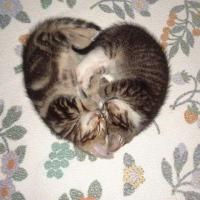المشاركات: 12
لغة: English
Aleksachjo (عرض الملف الشخصي) 23 ديسمبر، 2015 10:22:58 م
Jxono: Acx! Ho ve! Mi jxus kontrolis mian Kristnaska sxtrumpo. Mi recivis nenion ajn ke mi petis en mia letero al Kristnaska Viro!
Garfieldo: Vi devus skribi viajn leterojn Esperante....
Vidi gxin tie: http://www.picpaste.com/Kristnaskaletero.jpg
erinja (عرض الملف الشخصي) 24 ديسمبر، 2015 12:27:59 ص
Santa Claus is called "Paĉjo Kristnasko" in Esperanto. Don't forget your accusatives. Remember that "ke" and "kiu" are not the same; we use "ke" only in cases like "X said that Y", or "A thinks that B", or "L hopes that M", never in cases like "The B that A saw".
Some spelling errors - ricevis (with an e), bildostrio (stri, not stir).
Aleksachjo (عرض الملف الشخصي) 24 ديسمبر، 2015 2:58:56 ص
erinja:There are some errors. I'll give some hints and perhaps you can find most or all of the errors yourself?Thanks for the hints
Santa Claus is called "Paĉjo Kristnasko" in Esperanto. Don't forget your accusatives. Remember that "ke" and "kiu" are not the same; we use "ke" only in cases like "X said that Y", or "A thinks that B", or "L hopes that M", never in cases like "The B that A saw".
Some spelling errors - ricevis (with an e), bildostrio (stri, not stir).

About Kristnaska Viro, Pancxjo Kristnasko, Before starting this, I would have thought to Translate Father Christmas into Esperanto, Patro Kristnasko. This is the name of the Christmas gift-bringer in England, and this is the translation of Père Noël in France.
In the US Santa Claus is a continuation of the Saint Nicholas legend, so much that they are considered the same person. "Up on the housetop, reindeer pause, out jumps good ol' Santa Claus" and in the same song we get "Up on the housetop click, click, click, down through the chimney with Ol'St. Nick." Except when he wasn't. I have some friends of German Catholic heritage for whom Saint Nicholas gives candy in one's shoes on December 5, and Santa Claus gives more substantial gifts on Dec. 24,
Father Christmas (in England) an Kris Kringle from Christkind (in Germany) reflects the Protestant Reformation rejection of veneration of the saints.
But other countries have completely different traditions. Italy's La Befana is an old woman and in many Spanish-speaking countries gifts are brought by the Three Wise Men--on Epiphany.
So maybe the whole project was poorly conceived.

sergejm (عرض الملف الشخصي) 24 ديسمبر، 2015 5:36:22 ص
Garfieldo: Vi devus skribi viajn leterojn Esperante....
erinja (عرض الملف الشخصي) 24 ديسمبر، 2015 5:50:55 ص
Aleksachjo:But other countries have completely different traditions. Italy's La Befana is an old woman and in many Spanish-speaking countries gifts are brought by the Three Wise Men--on Epiphany.Not at all!
So maybe the whole project was poorly conceived.
Due to mass media, people in all sorts of countries know who this individual is and what he does (Santa Claus, Father Christmas, whatever you want to call him), even the countries who have a different tradition. I have frequently been to Italy in holiday time and for a while, a popular holiday decoration was a big Santa hanging out of a window by a rope ladder, as if he was trying to climb in. Italian children get nothing from Santa, they wait till January 6 when la Befana brings them candy in a stocking, of course, but Santa is still certainly part of the holiday landscape.
00100100 (عرض الملف الشخصي) 24 ديسمبر، 2015 6:23:37 م
erinja:Santa Claus is called "Paĉjo Kristnasko" in Esperanto.Is it the only name that's really in use? Or is it only one of the possible names that are in use among different groups?
Esperanto speakers in Canada seem to use Avo Frosto for Santa Claus. Vikipedio offers up Kristnaska Viro aŭ Patro Kristnasko. And, of course, going back to the root there's Sankta Nikolao.
erinja (عرض الملف الشخصي) 25 ديسمبر، 2015 4:29:31 ص
nornen (عرض الملف الشخصي) 25 ديسمبر، 2015 9:12:25 ص
erinja:Thanks to the Coca-Cola Company.Aleksachjo:But other countries have completely different traditions. Italy's La Befana is an old woman and in many Spanish-speaking countries gifts are brought by the Three Wise Men--on Epiphany.Not at all!
So maybe the whole project was poorly conceived.
Due to mass media, people in all sorts of countries know who this individual is and what he does (Santa Claus, Father Christmas, whatever you want to call him), even the countries who have a different tradition. I have frequently been to Italy in holiday time and for a while, a popular holiday decoration was a big Santa hanging out of a window by a rope ladder, as if he was trying to climb in. Italian children get nothing from Santa, they wait till January 6 when la Befana brings them candy in a stocking, of course, but Santa is still certainly part of the holiday landscape.
Muzikistino (عرض الملف الشخصي) 25 ديسمبر، 2015 11:05:27 ص
Christa627 (عرض الملف الشخصي) 27 ديسمبر، 2015 1:23:36 ص






